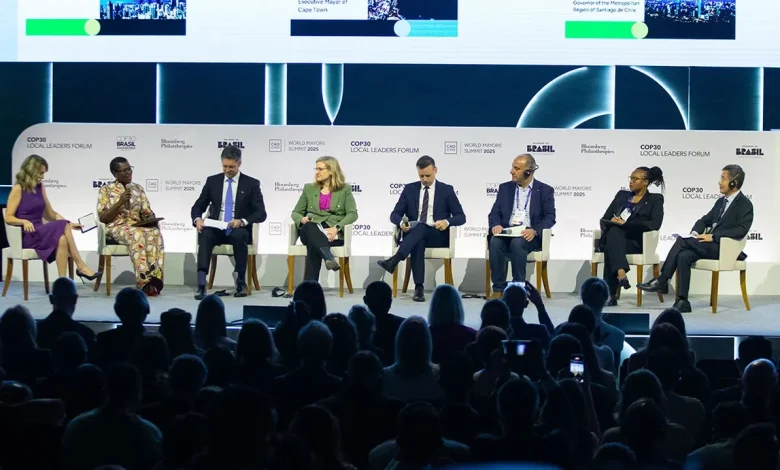Mayors, governors worldwide denounce Trump at Rio climate summit

The first day of the Global Forum of Local Leaders, held in Rio de Janeiro ahead of COP30 in Belém, was marked by strong criticism of U.S. President Donald Trump, who announced the country’s withdrawal from the Paris Agreement. Mayors and governors attending the event, which runs through Wednesday, also reaffirmed their commitment to addressing climate change and reducing greenhouse gas emissions.
At the opening of the summit, London Mayor Sadiq Khan called Mr. Trump the world’s leading “climate destroyer.” Mr. Khan, who also co-chairs the C40 Cities coalition—a global network of cities dedicated to fighting climate change—said the era of denial is over. “It’s no longer about who fights climate change and who denies it. It’s now an existential battle between the climate destroyers and us, the defenders of the climate,” he said. “Let’s be clear: the leading climate destroyer is the president of the United States of America, someone who addressed the United Nations just weeks ago and called the climate crisis a hoax.”
Mr. Khan emphasized the crucial role of subnational leaders—city governments, state agencies, and local authorities—in advancing adaptation and resilience efforts. “The climate destroyers are those clinging to the fossil fuels of the past. But groups like C40, the defenders of the climate, offer us an alternative,” he said.
As the host of the event, Rio Mayor Eduardo Paes called for subnational governments to be included in COP discussions. He also urged increased funding for urban climate initiatives and highlighted the importance of a more equitable distribution of resources between cities in developed and developing countries.
“There needs to be more funding available for urban climate initiatives. It is long overdue to strengthen the global climate finance system and allocate resources more equitably—especially toward cities in the so-called Global South, which have historically been ignored,” he said at the opening ceremony at the Museum of Modern Art (MAM).
Ana Toni, executive director of COP30, said that the engagement of local governments will be essential for the conference’s success in Brazil, scheduled for November 11-21. According to her, the Brazilian presidency has three main goals: to strengthen multilateralism, accelerate climate action, and demonstrate how the ecological transition can provide tangible benefits for the most affected populations. “We can only achieve these goals with mayors and governors on the front line,” she said.
Ms. Toni described COP30 as a “collective effort” and urged local leaders—especially Americans—to step up and fill the gap left by Mr. Trump’s decision. “I especially want to invite U.S. mayors to come. Thank you for being here and for the leadership you are showing,” she said.
During the event, the U.S. Climate Alliance, which includes 24 states representing 54% of the U.S. population and 57% of its economy, released its annual report. The report shows that member states reduced greenhouse gas emissions by 24% from 2005 to 2023, while their GDP grew by 34%, fueled by the expansion of clean technologies.
The Democratic governors of Wisconsin, Tony Evers, and New Mexico, Michelle Lujan Grisham, took part in the presentation, which included further criticism of the White House. “The federal government of our country may once again be absent from this COP, but America’s commitment and leadership are much greater than one person,” said Casey Katims, executive director of the U.S. Climate Alliance.
Governor Tony Evers said state governments faced a tough year ahead for climate policy and needed to stand up to Washington. “We were forced to confront the federal government, which is determined to roll back climate progress, while our national leaders denied basic scientific principles, harmed industries and American jobs, and raised costs for families,” he said.
According to him, the U.S. government aimed to cancel clean-energy projects and cut programs and investments that would help communities become more sustainable. “But all those bad policies only strengthened our resolve and motivated new actions,” he added.
Governor Lujan Grisham expressed disappointment in dealing with a federal administration that rejects the environmental agenda but emphasized that the alliance’s results demonstrate that states can make a difference. “It’s disappointing and troubling to have a federal government that rejects this progress and fails to invest in it. But what the report shows is that, regardless of the country’s political future, states can make an incredible difference on their own,” she said.





